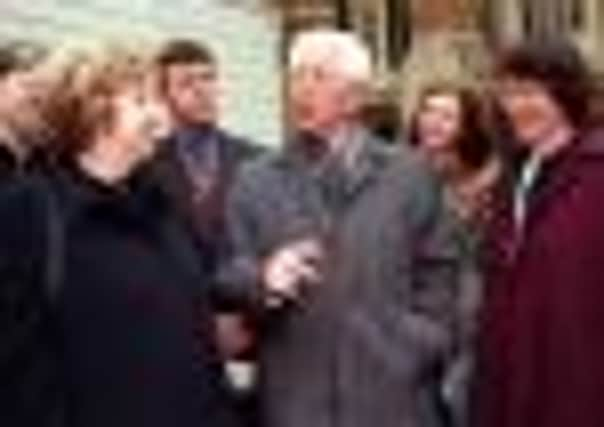Champion of disabled Lord Ashley dies at 89


His son-in-law Andrew Marr, a BBC presenter and husband of his Guardian columnist daughter Jackie, said that as well as championing the disabled, Ashley had won “major victories for the victims of the drug thalidomide, army bullying and domestic violence”.
Jackie, one of his three daughters , said she had lost a “wonderful, brave and adored father”.
Advertisement
Hide AdAdvertisement
Hide AdFormer prime minister Gordon Brown said: “Jack Ashley was the greatest champion Britain’s disabled have had. He was compassionate, direct, forceful and radical; the man who, speaking with the authority of personal experience, took the cause of disabled men and women into the chambers of Parliament and to the heart of government.
“He leaves behind a contribution in legislation and policy progress for the cause of tackling disability that will not easily be surpassed.”
Lord Morris of Manchester, who collaborated with Ashley when campaigning for disability rights, said: “Jack and I lived in close fellowship for over five decades. We campaigned and legislated together on improving the wellbeing of disabled people and others in special need. His passing will be mourned by everyone who had the privilege of knowing him.”
Labour leader Ed Miliband said: “Jack Ashley turned his own tragic experience of losing his hearing into a mission of courage and determination for deaf and disabled people.
“He was a pioneer as the first deaf MP to sit in Parliament but he did much more than that. There are many millions of men and women with disabilities who will have better lives thanks to Jack Ashley. He will be remembered with deep affection, profound respect and great admiration.”
Ashley won the seat of Stoke-on-Trent South in 1966, but lost his hearing less than two years later after a routine ear operation went wrong, something he described as “rather like being struck by lightning”.
He later recalled the last voice he heard was that of late rugby commentator Eddie Waring. After initially fearing he would be forced to give up politics, Ashley learned to lip-read. Other MPs, including political foes such as Tory premier Edward Heath, turned towards him during Commons debates so he could read their lips.
Unable to hear his own voice, Ashley also worked hard to modulate his delivery, but his deafness never dulled his determined approach.
Advertisement
Hide AdAdvertisement
Hide Ad“Early on when I first lost my hearing, I think people were a little fearful about attacking me. But as I re-established my confidence, that soon fell away,” he said.
As his fame as an advocate for disability rights grew, Ashley became president of the Royal National Institute for the Deaf. He also played a major role in the fight to secure improved compensation for children damaged by the drug thalidomide, which was given to mothers to prevent morning sickness in the 50s and 60s.
In 1993, a year after he was made a Labour life peer, Ashley’s hearing was partially restored by a cochlear implant.
Ashley left school at 14 to work in a factory, and later became a shop steward and a Labour councillor. He served in the army, and after the war won scholarships to study at Oxford and Cambridge, where he became the first working-class president of the union and chairman of the Labour Club. He worked as a producer for the BBC before entering parliament. Willing to work with all parties for his causes, during his time in government, Ashley resigned from the Department of Health and Social Security in protest at the fact that the thalidomide injection scheme was government sponsored and yet the victims were not originally paid compensation of any sort. He was still campaigning until 2009.
He was modest about his achievements, saying: “I was simply bringing about changes in the working environment and in the places where people lived. I think mine was a pragmatic approach.”